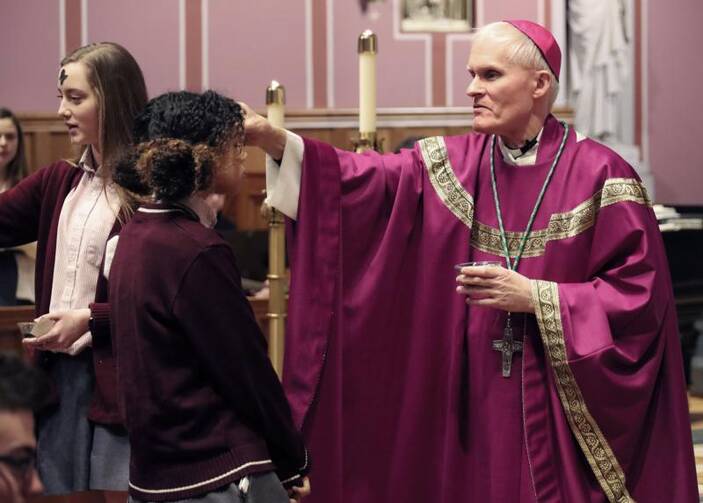WHEELING, W.Va. (CNS) -- Expanding the Diocese of Wheeling-Charleston's Safe Environment Program, Bishop Mark E. Brennan is requiring additional protocols to increase safety and reduce risk of sexual abuse in Catholic schools and parishes.
In a Feb. 20 letter to all pastors, administrators and principals of Catholic schools, the bishop announced he is expanding the requirement for fingerprinting to be part of background checks and that the diocese has engaged Corporate Security and Investigations of Pennsylvania as a third-party service provider that will conduct Safe Environment spot checks, site assessments and training.
"Today I write to you with hope and confidence that the efforts to establish a culture of safety and awareness in our diocese continue to move forward in significant ways," the bishop said in his letter.
Fingerprinting is now required of the bishop; all priests and deacons; all seminarians; all Catholic school principals, teachers, staff and certain volunteers; as well as chancery staff. Fingerprints will be submitted to, and housed with the FBI, as part of the background check process.
"The Diocese of Wheeling-Charleston Catholic schools are eager to be a part of the fingerprinting initiative," said Mary Ann Deschaine, superintendent of the schools. "We continue to work on providing opportunities to enhance our traditions of excellence in our Catholic schools. Participating in this fingerprinting initiative is the logical next step in improving our already rigorous Safe Environment policies."
Fingerprints will not be kept by schools or the diocese.
Continuing in his letter, Bishop Brennan said that Corporate Security and Investigations, or CSI, is an organization comprised of experienced professionals from law-enforcement, public safety, academia and the private sector, who specialize in various services focused upon safety.
Beginning this year, CSI representatives will be visiting parishes and schools to perform more frequent and regular spot checks to ensure compliance, accuracy and consistency at the local level.
CSI experts will also assess and evaluate site security and offer recommendations to enhance the physical safety of people, buildings and properties. The preliminary plan is to conduct site assessments by regions coupling them with fingerprinting and safe environment spot checks. CSI representatives also will review and offer suggestions for site security plans that parishes or schools already have in place.
The diocese, through CSI experts, and diocesan counsel, will also offer training on safety, de-escalation, and harassment of professional staff.
Bryan Minor, director of the diocese's Administrative Services and Safe Environment Process administrator, said the Office of Safe Environment deeply appreciates Bishop Brennan's commitment to its existing program and his vision for expansion.
"Our schoolchildren and our parishioners are our greatest gifts and our greatest resources," Minor said. "Ensuring their safety is an ongoing process that involves collaboration and cooperation on many fronts.
"There are many good, hard-working people throughout our diocese at the parish and school levels who are committed to helping the diocese create safe environments to worship and learn. Their efforts are deeply appreciated. These new measures that the diocese is undertaking illustrate Bishop Brennan's leadership toward creating a culture of safety throughout West Virginia."
Minor said the Safe Environment Office looks forward to working with parishes, schools, clergy, and seminarians throughout the diocese to implement these additional protocols.
"We hope these additional endeavors reassure the people of the diocese, and bring them some peace of mind, knowing that their safety remains a priority," he said.
The Office of Safe Environment strives to raise awareness and reduce risk throughout the diocese, Minor said, noting that the Safe Environment process is mandatory for employees and volunteers who work directly or indirectly with children.
"However, we actually encourage everyone to raise their situational awareness in any environment," he said. "Signs of abuse can be recognized anywhere, not just in churches or schools. Research shows that raising awareness can be as simple as reading a short article about a topic. Safe Environment also always encourages reporting to the appropriate authorities, civil first and foremost."
In addition to the new protocols to the Safe Environment Program, Bishop Brennan said in his letter that the diocese has worked for several months on the implementation of the third-party reporting system called Ethics Point, which is nearing completion; the expansion of various lay boards and implementation policies designed to provide necessary stewardship of church resources; the establishment of a victims assistance fund; and the continuation of encouraging the reporting of abuse to civil authorities first and foremost.
Bishop Brennan said: "It is my sincerest hope that the implementation of these measures, coupled with those upon which we already have embarked, will continue to illustrate our commitment to growing the culture of safety we all want to provide," Bishop Brennan said at the end of his letter.










